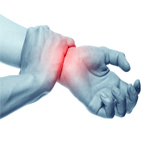Carpal Tunnel Syndrome can make daily tasks difficult. Do you find it difficult to firmly grasp a bottle, phone or door handle? Do you have numbness or tingling in your fingers, hand or wrist? Or, worse, is your wrist very painful? If you’re experiencing any of these issues, you may be afflicted with carpal tunnel syndrome.
Just above the carpal bones of the wrist, at the base of the palm, is a sleeve or tunnel where the arm’s nerves and tendons pass through to the hand and fingers. The nerve that passes through this narrow tunnel is called the median nerve, and the tunnel between the forearm and hand is called “the carpal tunnel”. Pinching or compression of the median nerve sets into motion a progressively crippling disorder that causes wrist pain, numbness and tingling in the hands. In fact, when you have carpal tunnel syndrome, hand motions can lead to extreme pain.
Causes and Symptoms of Carpal Tunnel

Many people ask is carpal tunnel work related? While carpal tunnel syndrome may result from numerous conditions, including inflammatory or non-inflammatory arthropathies, wrist trauma or fractures, diabetes mellitus, obesity, hypothyroidism, pregnancy and genetic factors, it is very rarely work related. Activities that can contribute to carpal tunnel are:
- Forceful use, particularly if repeated
- Repetitive hand use combined with some element of force, especially for prolonged periods
- Constant extended firm gripping of objects
- Moving or using the hand and wrist against resistance or with force over a prolonged period
- Exposing the hand and wrist to strong regular vibrations
Carpal tunnel syndrome typically starts gradually with a vague aching in your wrist that can extend to your hand or forearm. Common symptoms of carpal tunnel syndrome include:
- Tingling or numbness in your fingers or hand, especially your thumb and index, middle or ring fingers, but not your little finger
- Pain radiating or extending from your wrist up your arm to your shoulder or down into your palm or fingers, especially after forceful or repetitive use, usually occurring on the palm-side of your forearm
- Weakness in your hands and a tendency to drop objects
NJ Physical Therapy and Surgery Treatments for Carpal Tunnel Syndrome

Non-Operative Treatments
NJ physical therapy at AOSMI applies advanced techniques to ensure that where possible your condition is diagnosed without surgery. We develop long-range plans of treatment and physical therapy to address symptoms of carpal tunnel syndrome caused by work-related activities. We continuously discover new and more effective methods of evaluating, treating and rehabilitating our patients without surgery.
Common Surgical Procedures
AOSMI has several board-certified orthopedic surgeons, including Dr. James Cozzarelli who specializes in hand, wrist and elbow care and Dr. Paul Joseph Chubb who specializes in hand care, who are able to examine and select the proper treatment for your carpal tunnel syndrome. When surgery is determined necessary as far as treatments for carpal tunnel syndrome, you may undergo endoscopic carpal tunnel release.
To learn more about our Surgeons at AOSMI, contact us today.







